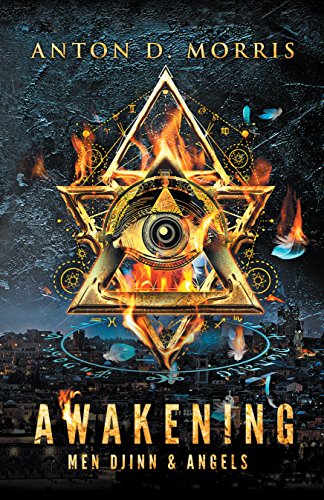
«Men, Djinn and Angels» is the first (as far as I know) book published by Anton Morris. It is a fantasy book that deals with the supernatural. Throughout history, we have heard stories of miracles, of people having unnatural powers over the universe, of the existence of something or someone higher than us. Anton’s book explores many of these concepts in the context of human interactions, their tragedy, memories, and the means of fulfillment.
For the lazy ones, I shall mention my assessment of this book before discussing it in more detail. I definitely enjoyed the story enough to one day re-read it. The lore is quite vast and intriguing. And many chapters are genuinely fun to read. Yet the book is far from perfect. While the idea is good, the implementation, in my opinion, suffers. I still finished reading without difficulty, and maybe you will too. However, for many people, the lore and the idea behind the book will not be enough. Perhaps they will disagree with me and find much more within this book than I ever could. There is only one way to find out!
Now, let’s talk about the story. The main hero is a young man called Talib. He grew up in Palestine during its constant conflict with Israel. But we don’t know that from the start. The book starts with Talib alone, weary and hungry. He’s trying to reach Alexandria and has already had to bribe his way to Ashqelon. But he’s still far away from his destination. Without enough money to buy a ticket that would take him farther, he thinks about bribing his way forward again when he meets Theodore. First, Talib is cautious of him, but then he takes Theodore’s offer, and they go to Alexandria together.
Further on, we learn a bit about Theodore. He seeks ancient artifacts. He is wealthy and, apparently, kind enough to help poor Talib. Yet, we don’t know his true intentions.
And at the end of the chapter, we see Talib’s dream. We see a man made of pure light and witness the power of his weapon. For some reason, he is fighting people. An ancient Mongolian army, no less. The dream tells me that the book will jump back and forth in time, unraveling glorious events. We see how the light-man makes a symbol with the bodies he just killed, which suggests that the book will be filled with symbolism. When I saw that the man saw and attacked Talib, I wondered if the light-man could feel that Talib was watching him. Or was Talib really so far back in time, in one form or another?
Those were some of my questions, and I had many more. This first chapter is quite well written. It made me care about Talib and pity him. It made me curious as to why he had to reach Alexandria and as to the true nature of his dream and of the light-man. It made me wonder about Talib’s talisman and about Theodore’s true intentions.
Many of those questions were answered, indeed. I learned about angels and djinn. About ways that men interacted with them. About their place in the universe and their relations with each other. And, of course, I learned more about Talib and the Brotherhood that rules the world. Yet, all of it was done with a price. Aside from the main plot, this book consists of a big collection of different stories. Anton starts from the beginning to explain his vision. Through the eyes of various members of the Brotherhood, he makes us watch the mysteries unravel. He moves us through time, showing the major events of Earth’s history. And through this, I learned that such events as World War I, the Thirty Ears War, and many other conflicts were influenced by various spirits and actions of the Brotherhood itself.
So, what was the price I mentioned? The price was that Talib seized to be an active character after the first chapter. Myriads of other people have taken his place, and I failed to connect to anyone but a few of them. Seeing the action was enjoyable, but I did not care about people telling the stories. More importantly, I immediately mixed up all their names. So, for me, there were the Brothers, the ordinary people, and the supernatural. It wasn’t too bad – most stories did not require me to care about the individuals. I enjoyed the lore, the universe, and that was enough. But if those stories had had more to them, if they made me care more — then those tales would have been much stronger.
So, why didn’t I care about the people? Because they weren’t real. They dreamed of the intangible: ending the world’s wars and famine, ruling the countries and societies, etc. Their achievements weren’t real: I was told how bright those people were, but I hardly ever saw that in action. Only their feelings seemed real, but it wasn’t enough for me.
The only story I genuinely enjoyed for what it was, and not for its lore, was the one with the giants against the Spanish. In that one, the main character was actually charismatic. He worried not about something far away — he was concerned about his clan's and daughter's well-being. I saw his cunningness in action, not just heard about it from the narrator. He made a mistake, and I was sympathetic. There was a bit of humor in the way the story was told. All of this made the ending feel deserved and enjoyable. All of this made me care much more.
So, now you know what I feel. I told you why I liked the book and why I didn’t. I told you that I would re-read it one day. And I will find people to whom I can recommend the tome. Whether you shall spend your time and try it — that’s up to you to decide.
Available on
